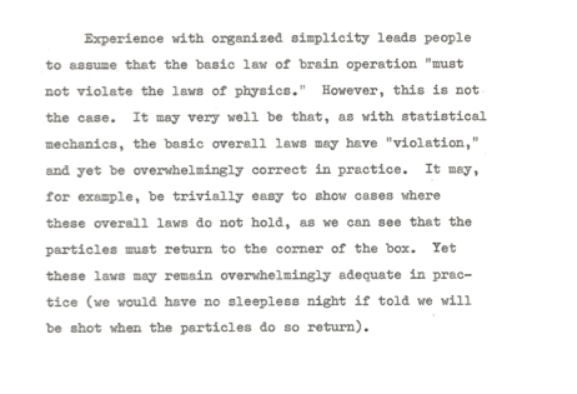Selected Quotes
Categories
- ART 7
- ENACTIVISM 7
- EVOLUTION 5
- GOD 9
- HEBB 3
- HISTORY 7
- HOW THE BRAIN WORKS 18
- MENTAL ILLNESS & etc. 8
- OVERVIEW OF MODEL 16
- PROBABILITY 1
- SCHISM 3
- UNIVERSAL MODEL 5
- VALUES 19
- VARIOUS QUOTES and BUNDLED QUOTES 4
- WHEELER 7
- WORD 19
- x A LIST of SYMBOLS & DIAGRAMS & PICTURES 3
- x Additional Putnam Quotes 17
- x BARRY comments on paper FORMULATION of VALUES 1
- x Transcriptions of Putnam_Spinello conversations 3
All Areas of the Brain function as the Same
Putnam-Fuller NS model 1964 pg
“there is a vast body of evidence pointing to the uniform functional character of all areas of the brain. Areas differ only in the parameters of this common function, as for example time constants, and ratio of cells of different “type”, and in the areas linked by the wires that come and go, etc. The uniform functional character of all areas force us to look to the structure of the environment, or the inputs themselves, as the source stabilizing internal structure.”
“Special brain centers do not represent a violation of this simple functional picture. Rather they reflect the correlated nature of the environmental inputs, and their breakup into such classes for special processing.”
SEE JOACHIN FUSTER LECTURE
SEE Coleman Clarke’s letter to BJS re ALL AREAS OF THE BRAIN SAME
Random Search & Steady State Shape Behavior
…It is a central contention of this model that the internal Random Search for Steady State is the basic shaper of behavior, not the external conditions of reinforcement.
HOWEVER:
Thought is a property of the class of the correlates fed into the brain from the environment. The order manifested by the nervous system originates as the internalization of an external order. Lect Notes Sci & Phil #5 1966 pg 16
Without external stimulus constantly fed in, the brain would rapidly ceace to function. Still, once fed in it is RS and SS that shape behavior not the external source.
BJS: The external provision of food to a dog will cause the dog to salivate.
But only if the dog is hungry - It is the internal stimulus (hunger) that shapes the behavior. The external stimulus is not the cause of the salivation - but only prompts the internal.















